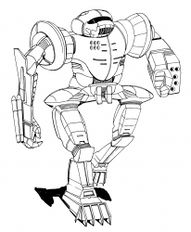Naja

| |
| Naja | |
|---|---|
| Production information | |
| Manufacturer | General Mechanics |
| Production Year | 2587 |
| Class | Medium |
| Technical specifications | |
| 'Mech type | Mixed-tech BattleMech |
| Mass | 55 tons |
| Chassis | CCTech-2[1] |
| Armor | Standard Composition A |
| Engine | Core Tek 275 |
| Communications System | CCC T-45 |
| Targeting Tracking System | CCC D4.1j |
| Heat Sinks | 14 Double Heat Sinks |
| Speed | 86.4[1] km/h |
| Armament |
|
| BV (2.0) | 1,636[2] |
Contents
Description
The Naja was created by Clan Cloud Cobra to take advantage of the Clan's new improved missile launchers. By using the Kintaro chassis engineers were able to quickly put the 'Mech into production, a key consideration as the Cobras were trying to build up their touman quickly. The Naja was very popular with the Cobras but other Clans didn't use it frequently. In fact they would often trade captured Najas back to the Cloud Cobras. After the Cobras decided to focus on their aerospace arm, the Naja was largely removed from service.[1]
Weapons and Equipment
The Naja was built around a combination of long and short range missile launchers. The Clan spec LRM-20 provides most of the firepower, while at close range the Improved SRM-6s and SRM-4s can unleash a deadly barrage of missiles. Protected by twelve tons of standard armor plate, the Naja is heavily armored. Despite these advantages, the Naja is still vulnerable to enemy fire because it uses a bulkier Inner Sphere XL Engine and Double Heat Sinks.
Design Quirks
The Naja has the following Design Quirks:<ref name=trogc23>
- Non-Standard Parts/SRM6s (after 2828)
- Easy to Maintain
Related 'Mechs
- Kintaro - The predecessor design that led to the Naja.
Notes
The Naja writeup on pp. 22-23 shows that it uses extended range lasers, but the record sheet shows it uses standard lasers. This contradiction will be resolved when answer from CGL arrives.


